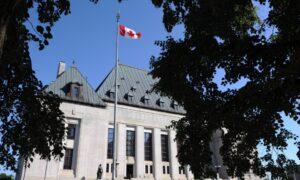The Alberta government has declared its intention to take Ottawa to court following the federal government’s failure to address concerns related to the amended Impact Assessment Act within the four-week deadline set by the province.
Alberta officials announced that they have initiated legal proceedings with the province’s Court of Appeal on the morning of Nov. 28 after not receiving a response from Ottawa by the specified deadline that was initially declared in early October. The legal challenge is based on the constitutionality of the amended Impact Assessment Act, which Alberta argues grants the federal government control over projects falling under Alberta’s “exclusive jurisdiction.”
Alberta Justice Minister Mickey Amery stated during a press conference on Nov. 28 that, “We gave the federal government four weeks to respond to our concerns, but they did not meaningfully address them. Alberta will not be ignored. Since the federal government is not willing to cooperate with us, we are taking them right back to court again.”
The Impact Assessment Act, previously known as Bill C-69, imposes federal environmental evaluation requirements on major projects, including pipelines.
Alberta contends that the legislation places an unnecessary burden on projects and has challenged its constitutionality in courts, citing an infringement on provincial jurisdiction.
In an October 2023 ruling, the Supreme Court of Canada found that the act was “largely unconstitutional,” prompting the federal government to amend the legislation, which came into force on June 20.
Premier Danielle Smith expressed dissatisfaction with the lack of meaningful consultation during the amendment process, despite repeated requests. On Oct. 3, she sent a letter to Prime Minister Justin Trudeau outlining a list of proposed amendments to address the province’s ongoing concerns.
“The Impact Assessment Act has created a lengthy and complex approval process that may deter potential investors from investing in Alberta,” Smith emphasized during the Nov. 28 press conference. “Capital moves where it can achieve the highest and most secure returns, and Canada is increasingly viewed as a risky investment destination.”
Proposed amendments from Alberta include establishing clear approval timelines to provide investors with greater certainty, recognizing provincial environmental assessments as equal to federal ones, and restricting government overreach.
The federal government stated in June that the amended act responds meaningfully to the Superior Court’s ruling, addressing decision-making in areas of clear federal jurisdiction and enhancing cooperation with other jurisdictions in the spirit of federalism.
The act’s primary purpose is to promote sustainability and protect the environment from adverse effects resulting from major projects. Federal Environment Minister Steven Guilbeault has expressed that the legislation will streamline project assessments while ensuring environmental and indigenous rights protection.
Alberta Opposition NDP Leader Naheed Nenshi criticized the provincial government’s approach, stating that their actions will not resolve the issue.
“The regulations from the Harper era and Trudeau’s Bill C-69 have been ineffective, and the Smith government does not have viable solutions to offer,” Nenshi commented on social media platform X on Nov. 28. “Simply engaging in legal battles without clear outcomes will not address our needs.”
Alberta first contested the constitutionality of the Impact Assessment Act in September 2019, labeling it the “No More Pipelines Act” due to the perceived regulatory obstacles imposed by the legislation.
Alberta has also opposed other environmental measures proposed by the federal government, including the oil and gas emissions cap. Recently, the province announced its intention to introduce a motion under its Sovereignty Act, enabling the province to take countermeasures if the emissions cap is enacted.
Justice Minister Amery disclosed that Alberta is currently engaged in ten active disputes with Ottawa, covering various issues such as the federal firearms ban, Emergencies Act, plastics ban, Fertilizers Act, and home heating carbon tax exemption.





